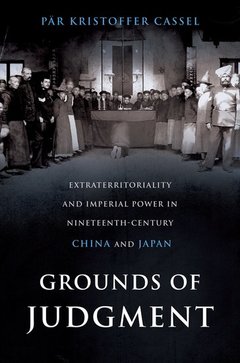Grounds of Judgment Extraterritoriality and Imperial Power in Nineteenth-Century China and Japan Oxford Studies in International History Series
Langue : Anglais
Auteur : Cassel Par Kristoffer

Grounds of Judgment reopens the question of consular jurisdiction and extraterritoriality in China and Japan. The book combines recent findings in Qing history on the nature of ethnicity and law with the history of the treaty ports in both China and Japan, especially Shanghai, Yokohama and Nagasaki. Extraterritoriality was not implanted into East Asia as a ready-made product, but developed in a dialogue with local precedents, local understandings of power, and local institutions, which are best understood within the complex triangular relationship between China, Japan and the West. A close reading of treaty texts and other relevant documents suggests that a Qing institution for the adjudication for Manchu-Chinese disputes served as the model for both the International Mixed Court in Shanghai and the extraterritorial arrangements in Sino-Japanese Treaty of Tianjin in 1871. The adaptability of Qing legal procedure provided for a relatively seamless transition into the treaty port era, which would have momentous consequences for China's national sovereignty in the twentieth century. There was no parallel to this development in the Japanese case. Instead, Japanese authorities chose not to integrate consular courts and mixed courts into the indigenous legal order, and as a consequence, consular jurisdiction remained an alien body in the Japanese state, and Japanese policymakers were determined to keep it that way.
Acknowledgments. Introduction. Chapter 1 Excavating Extraterritoriality: The Legacies of Legal Pluralism, Subjecthood, and State-Building in China and Japan. Chapter 2 Codifying extraterritoriality: The Chinese "Unequal Treaties". Chapter 3 Institutionalizing Extraterritoriality: The Mixed Court and the British Supreme Court in Shanghai. Chapter 4 Exporting Extraterritoriality: The Evolution of Jurisdiction over Foreigners in Japan from the "Expulsion Edict" to the "Treaty of Tianjin". Chapter 5 Executing Extraterritoriality: Sino-Japanese Cases under the Treaty of Tianjin. Chapter 6: Expelling Extraterritoriality: Treaty Revision in Meiji Japan and Qing China, 1860-1912. Conclusion. Glossary. Notes. Bibliography.
Assistant Professor of History, University of Michigan
Date de parution : 01-2012
Ouvrage de 272 p.
23.6x16.3 cm
Thème de Grounds of Judgment :
© 2024 LAVOISIER S.A.S.


